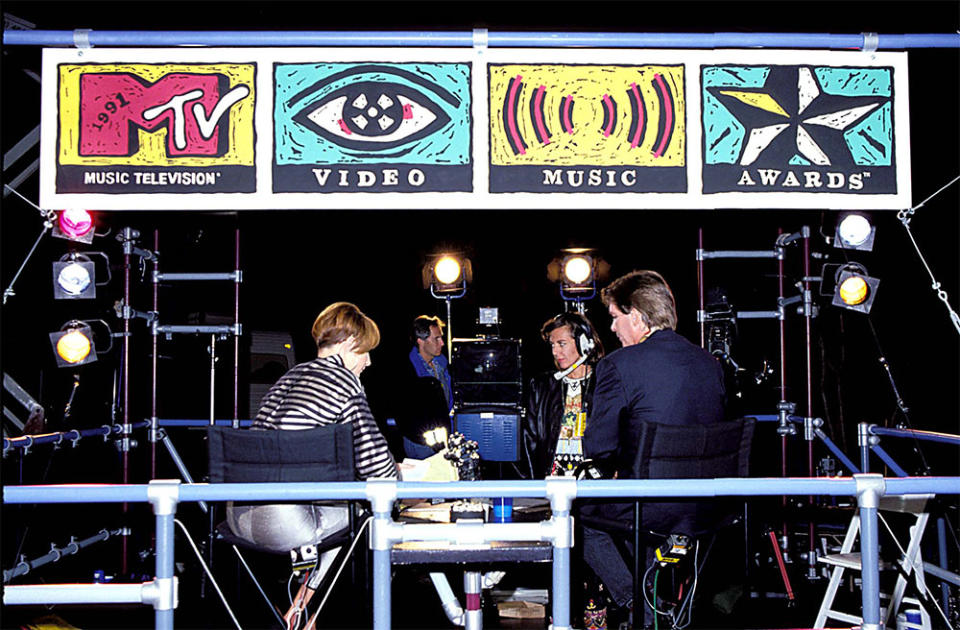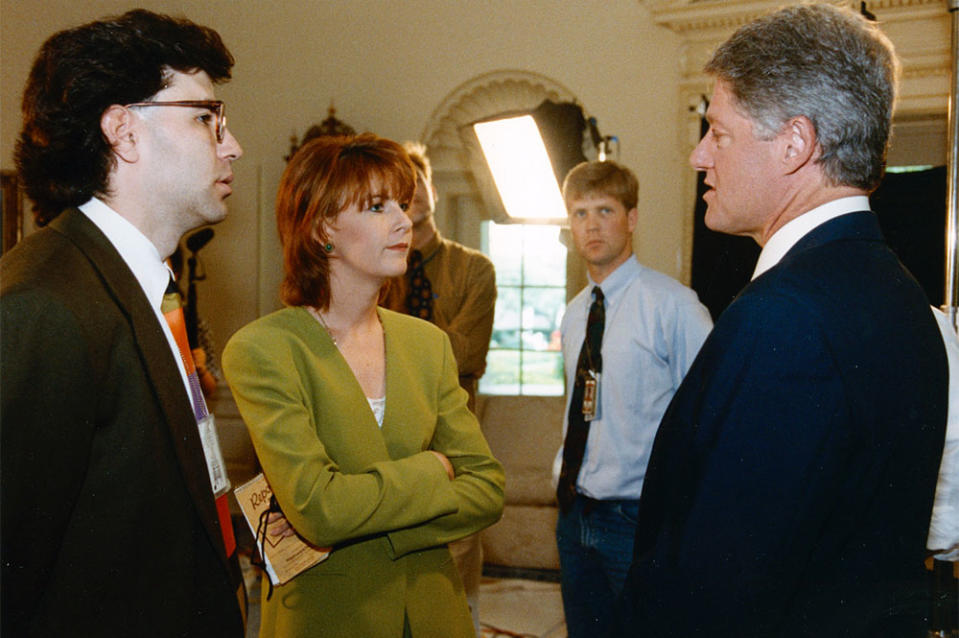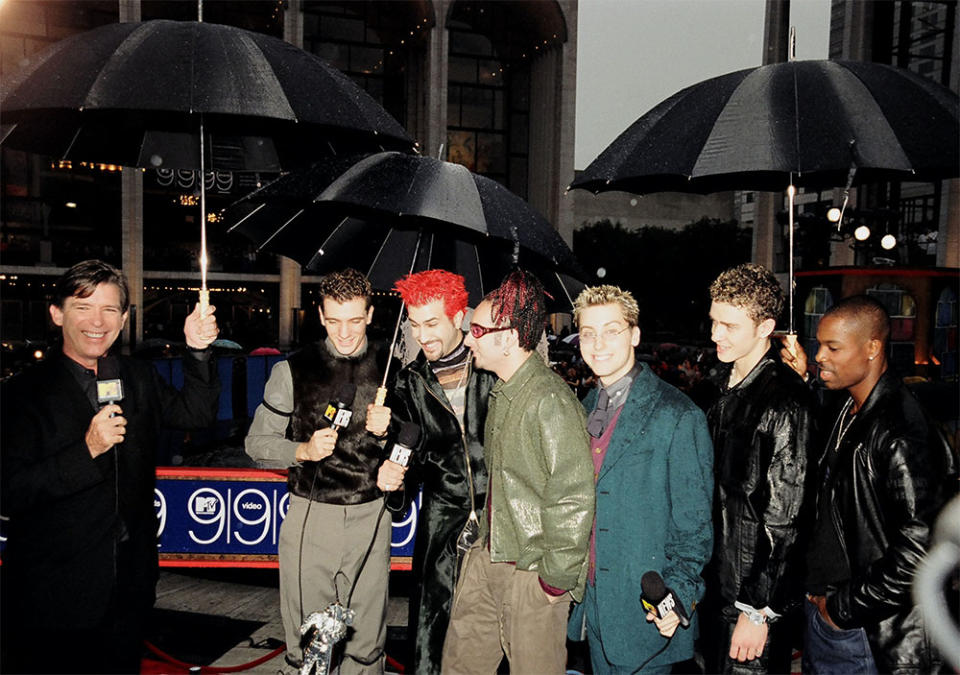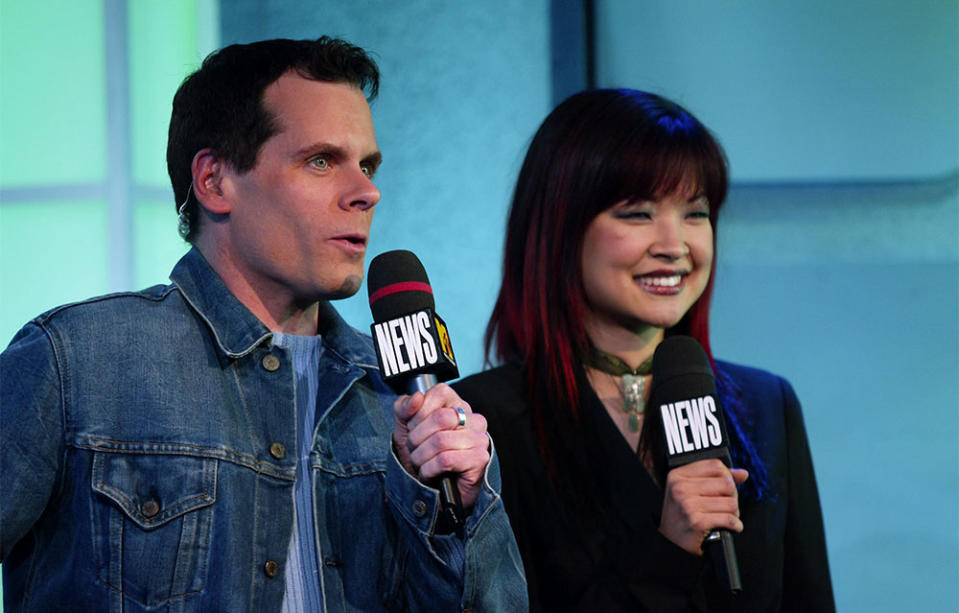“It Was Lightning in a Bottle”: An Oral History of MTV News
- Oops!Something went wrong.Please try again later.
- Oops!Something went wrong.Please try again later.
- Oops!Something went wrong.Please try again later.
- Oops!Something went wrong.Please try again later.
- Oops!Something went wrong.Please try again later.
In the late 1980s, a group of grumpy music journalism vets and fresh-faced 20-somethings came together for a radical media experiment: the launch of a cable news division programmed for, and largely run by American youth. On May 9, 2023 — 36 years after its inception — Paramount announced that the fruits of their labor, MTV News, had been shuttered for good.
The Hollywood Reporter reached out to many of MTV News’ star reporters — Kurt Loder, Tabitha Soren, John Norris, Alison Stewart, Chris Connelly, SuChin Pak and Gideon Yago — and visionary executives Doug Herzog and Ocean MacAdams to reminisce about the glory days of the outfit, where one day you might be hanging backstage with Prince in Paris, the next chasing a pre-White House Bill Clinton through the snowy streets of New Hampshire.
More from The Hollywood Reporter
Warner Bros. Discovery and Paramount Global Have Held Meeting to Discuss Possible Merger
China's Hainan Film Festival Accused of Not Paying Prize Money to Past Winners
"For Sale" Sign on Paramount Will Shape Shari Redstone's Legacy
For each of them, it was a bittersweet journey they were more than happy to take.
ALISON STEWART I tell my nieces, who are in their 30s, I’m like, “Just imagine it.” (Laughs.) It’s so hard for somebody who’s under 30 to really understand — and I hope this doesn’t sound grandiose — how important it was, and the need it filled, and the way MTV News spoke to young Americans in a way that they understood.
DOUG HERZOG If you don’t remember, it’s really hard to wrap your head around what a major cultural force and influence MTV was for young people during that period. I say to my own kids, “It was like TikTok and Snapchat and Instagram and Spotify and YouTube all rolled into one.” It’s just what everybody did and where everybody went if you were under 30.
JOHN NORRIS I got pretty well-known. I think we all did.
GIDEON YAGO I remember at this one reunion we were just going through all of the bands that we were able to put on the map, all of the stories that we were able to break. It was just a run. It was like a sports team where it was just like we had something great for a couple of years there.
KURT LODER Everybody was pretty nice on the street. I think somebody tried to punch me out once, but I was in a bar, so who knows? They’ll come and say hi or whatever. MTV viewers were really into music. They knew a lot about it, and it wasn’t just a passing thing with them.
HERZOG MTV was started in ’81. I arrived in September of ’84 and was given the title “news director.” I had three news copywriters who were basically ripping stories from Billboard and rewriting press releases. I was told to build a budget and create a news department. Pretty shortly thereafter, we had formal news breaks — the VJs handled those. We started to build a little department.
The big turning point for MTV News was Live Aid in 1985. We brought our whole team down there and we were shooting and editing stories in real-time and running them over to the truck and they’d run them. The VJs, like Martha [Quinn] and Alan [Hunter], were onstage hosting, and they got a lot of criticism that day. I think people thought they were sort of boring and fluffy. We had felt a reluctance for artists to come into the studio and talk to the VJs. I think they wanted to talk to somebody more credible. We sat around going, “You know, like the guys at Rolling Stone.” So Linda Corradina, who was news director at that point, came up with this idea to approach Kurt Loder from Rolling Stone.
LODER Linda Corradina called me and asked, “Have you thought about being in TV?” I hadn’t — ever. So I went over and did a camera test, which was pretty awful, I think. And suddenly, I was there.
HERZOG Kurt was this old-school rock critic writer, a little on the grumpy side. Rolling Stone was no fan of MTV. They always wrote really shitty things about us. I think they rightly saw us as their competition. But Kurt said yes.

TABITHA SOREN I came to MTV from a very straight news background, although I did work at MTV in college. What I had to bring to the table was a very “who, what, when, where and why” approach to the world and a passion for politics. And I had covered the mayoral race when I was [senior correspondent] Gabe Pressman’s assistant at [New York TV station] WNBC. I went to Vermont and I covered the gubernatorial race with Governor Madeleine Kunin for ABC.
LODER The idea was to do something serious, something that would actually be news-gathering. And it sounded good to me. I worked in newspapers, and so that was good. And they wanted to cover things beyond the usual show coverage and not be too beholden to the powers that be.
NORRIS It was an NYU internship that turned into a writing job in the MTV News department. Kurt came in [in 1987 to host The Week in Rock.] I was there, his cub writer in the news department. After about a year, they needed someone to be his alternate when he would travel. I was sort of in the right place at the right time. Full disclosure, I was like kind of a kid actor. Then I was a journalism major. I guess I was fairly comfortable on camera. Then they asked me to be an alternate to Kurt. That was in 1990, and I stayed there through the very end of 2008, when I was let go as part of another round of layoffs by Viacom.
CHRIS CONNELLY I started there in ’88, but I wasn’t in MTV News. I hosted a movie program. I’m not even entirely sure when I officially joined MTV News. But sometime in the mid-’90s I wound up as an MTV News employee. By then, Kurt and Tabitha and Alison Stewart were already up and running.
OCEAN MACADAMS I joined MTV News as the assignment editor in ’96, which was essentially a kind of talent relations. “We want to interview Hootie and the Blowfish, can you help make that happen?” Then I had pretty much every job that you could have. Eventually, I ended up running things. MTV News had two divisions: the docs department and the daily news operation. I was the svp in charge of the daily news and live event coverage. My last day was producing Obama’s inaugural ball in 2009, so I got to go out on a fun note.
YAGO I was a student at Columbia University, and they were casting for people to cover the 2000 election. I think the conceit was that they were going to send “real kids from real walks of life all around America to tell news stories.” It was called the Street Team. I just happened to walk in with a friend of mine. A couple weeks later, they gave me the offer for the job, and a couple weeks after that, I was on George W. Bush’s bus in New Hampshire. It was like being in the nose cone of a rocket. I was a bar back and I was 21 years old, and then my life was irrevocably changed.
LODER I wasn’t very good at it when I started out. But once you get used to sitting in a room and talking to an inanimate object, it’s easy. That didn’t take a lot of time.
SOREN There was this comedian named Jim Turner. He did a character called Randee of the Redwoods. MTV ran him for president. And so they had entered into the political space before I got there, but they had done it with satire.
In ’91, I was interviewing various rock bands that Kurt didn’t want to get near. I said to [MTV news director] Dave Sirulnick, “I do have this background in politics. Would the news department ever cover politics and young voters?” I think I was 22 at the time. He said, “I would do that if I had somebody really excited about it.” And I said, “That would be me.”
YAGO We got so much shit. At first, everybody thought we were a fucking joke. During my time there, we tried to make it as legitimate as possible as a news source for young people.
STEWART I was a producer first. I used to produce the political coverage. I was at work late one Friday, and Dave Sirulnick came through the newsroom and said, “Hey, you like politics, right?” And I was like, “Yeah.” He’s like, “OK, do you know Tabitha?” I’m like, “I think I met her. Yeah. She’s new, right?” He said, “OK, you two are going to New Hampshire.” And I was in New Hampshire a week later chasing Bill Clinton through a snow drift to a library. I mean, it was insane. And I don’t think I went home. I lived out of a suitcase for that entire ’92 election.

SOREN New Hampshire was the scariest flight I’ve ever been on. I really thought we were all going to die. Oh my God. And I was holding my boss’ hand like he was my father, which was ridiculous, but I was terrified. We got to the hotel, the heat was broken. We all had to sleep with like bathroom towels on top of our beds [to stay warm,] our teeth chattering.
But the audience really liked [our campaign coverage]. Because of that, Viacom figured out that they could sell to advertisers outside of our normal demographic.
STEWART I remember taking Treach from Naughty by Nature to the Republican National Convention. I’ve got this great picture of him interviewing a Black Republican and they’re really trying to understand each other. That was a trip. But it was also really interesting.
CONNELLY We were targeting youth culture — a young audience that wasn’t being served by mainstream media. During the 2000 election cycle, we did a thing called Where Were You at 22?, where we talked to all of the presidential candidates about what their lives had been between the ages of 18 and 22. Everybody from Pat Buchanan to Al Gore and John McCain, who had the most remarkable life of any of them. That was the great thing about MTV: You could talk to the audience in a unique way because the audience was very specific. The Choose or Lose team, or the Street Team, did such a great job. That’s where Gideon came from, and a whole bunch of other talented people.
STEWART We asked the questions of politicians that [young voters] wanted asked. They wanted to know about student loans, they wanted to know about health care, they wanted to know about gun violence. Those were the kind of stories we were covering — as well as Kurt Cobain and the Black Crows and Salt-N-Pepa.
HERZOG It’s Choose or Lose — which won a Peabody in 1992 — that ultimately led to, you know, Bill Clinton coming on MTV and talking about “boxers or briefs.” That question was planted by MTV, by the way.
YAGO I was a latchkey kid and MTV and The Week in Rock were my best friends. Tabitha, Kurt, Serena [Altschul], Chris, John — these were my heroes. So you have these kinds of parasocial relationships with MTV News. It explained to me Clinton’s runs for president. It explained to me Kurt Cobain’s death. It was my friend. And then somebody says, “You want to step through the television and do this?” That first year was super fun. I was able to interview bands and do all of this stuff that I would have paid to do.
MACADAMS Until MTV News, there was just nobody else reporting on music and pop culture — not only in that way, but also just at all. If there was a controversy around Madonna or Guns N’ Roses was announcing its tour date, MTV News was the place that reported that.
SOREN Kurt knew every bit of music history. His musicology was just such a gift for me to learn from. Never mind his writing experience. He always said, “Tabitha, you can’t use ‘seems.’ It either is or it isn’t.”
LODER We did a lot of stuff with Prince, did a lot of stuff with Madonna, shot stuff in Japan and all over Europe and it was tons of fun. There was so much money in the business that they could afford to send reporters around and send camera crews around and cover stuff. I’m not sure that is done anymore. We did something with Prince in Paris where he was backstage, standing there with a little pink boombox listening to some tapes of stuff he had recorded. And he looked up and he said, “I’m just taking dictation.” It was so cute. He was a really smart, interesting guy.
STEWART I did my first full-length piece in January of 1993 where I took RuPaul to a mall in New Jersey. When you think about the time and the context, that was a wild thing to do. We went out into the part of the country that wasn’t New York or L.A. You’d meet kids, especially gay kids, working-class kids who never saw anybody like them on TV. They didn’t feel represented, but they were very grateful for the kind of programming we did.
CONNELLY We did a lot of red carpet coverage, but they sent me to Columbine. I was lucky to have the great producer Betsy Forhan with me. We knew it was a serious moment. I don’t know that we could have predicted at the time what would be happening now with regard to gun violence and mass shootings. But we knew it was significant and we wanted to try to tell a story in a way that our audience would appreciate. I remember the Matthew Shepherd coverage as really being standout.
NORRIS At Columbine, I was on with Chris Connelly. That was definitely happening during TRL in real-time. That was intense, obviously.
LODER Woodstock ’99 was kind of ugly. It was terrible. It was just the worst experience and people started setting fires. It was so all ugly the way it was staged, and people who put that thing together were so bad. You had to sit on hot pavement. They were selling like, bottles of water for $10. At night they started setting fires, and actually, we were told we had to leave. Security people told us to get out of there. So we did. It was awful because the people who put that on were treating the fans so badly. They were just robbing them. It was disgusting in every way.
YAGO The real moment where it shifted was 9/11. I walked in on 9/11 and there was [MTV chairwoman] Judy McGrath pacing around near the studio on the ground floor, and she took one look at me and she said, “Put on a clean shirt. You have to go on TV in 10 minutes.” Some of the stuff that we did around that time for our audience is some of the stuff that I’m proudest of in my entire professional career. The people that I did it with are still some of the people that I’m closest with in this world. That’s where, when you talk about something like MTV News leaving the ecosystem, you feel it like a gut punch.
I just remember standing in the news bullpen watching the first tower go down. Ocean was there, a handful of other people. Then the sirens went off in the building to evacuate, and a bunch of us recovered to an apartment really nearby. And we started to get to work and figure out how we were going to explain this to an audience of millions of millennials. How were you going to make sense of the fact that reality had changed?
SUCHIN PAK One night, you’re at a debaucherous party with P. Diddy airing live from the Hammerstein Ballroom or something, then a few days later it’s 9/11. That was the rhythm there, where you would be like at the VMAs and then you’re in Louisiana post-Katrina. It was constantly this weird buffet of extremes. That buffet, for me at least, and I think a lot of people, is very addictive.
SOREN There was John Norris, who took Whitney Houston and Michael Jackson as seriously as I took Nirvana and Liz Phair. And we got along and we respected those influences. John’s interest in George Michael, someone I didn’t really think about, made me think twice about being so tribal about music.
HERZOG We became a little bit of the hip center at MTV and the envy of the people who programmed music, who wanted to stretch out a little more. We would do stories on The Replacements or the very early days of hip-hop. We’d run stories on Run-D.M.C. before they were even getting played on the network.
CONNELLY Tabitha live-anchored when the O.J. Simpson verdict came in. There’s Kurt talking to Madonna and Courtney Love.
STEWART Tupac Shakur’s death. I remember calling that in because I used to get up really early. Kurt Cobain’s death, the coverage of AIDS and Gay Kids Under Fire was big. We also did a lot of gun violence activism with the Enough Is Enough campaign in 1994.

SOREN We were not operating in a vacuum. There was Rock the Vote, which people often conflate with Choose or Lose. Rock the Vote was a music industry thing. They had some very compelling, attention-getting pleas from very famous musicians to get people to vote: Madonna wrapping herself in an American flag. Stuff like that. And that was separate from us. But it was a total zeitgeist. All of it increased the number of young people who voted.
STEWART It was one of those lightning-in-a-bottle times. It really was. We’re still in a Facebook group.
PAK It just kind of all bled into one giant experience where it just never felt like MTV was ever off for me. Living in New York at the time, when you’re in your 20s, it’s the best. It’s like everybody’s so young and we’re all like, horny and going out and single and working and ambitious. You’re all living and working in the same place. In that respect, it felt more like college than anything; we were all in the same place, in the same moment in our lives.
STEWART One of the reasons I left, honestly, was I was interviewing Stone Temple Pilots’ Scott Weiland and it was clear he was killing himself with alcohol and drugs. And I was sitting there interviewing him and his pupils were like saucers and he couldn’t really speak. And I was like, “Somebody’s got to help this guy.” Like, I’m having a really hard time interviewing him. Like, he’s a mess. I just feel really bad for him. “Like, are you guys going to intervene? Record company? Somebody do something.” And I was like, “I don’t know if I want to do this anymore.”
PAK When it came to celebrity interviews, I was always trying to figure out, “OK, how do I get to the part that’s vulnerable without exploiting them?” Looking back, I think that that’s a whole other conversation of like, did we exploit these pop stars in a way that was beneficial to the bottom line? I remember an interview with Britney Spears and she said something to me about not having any friends, like not having someone to call at the end of the night — like a girlfriend. It struck me at that moment just how young she was and how incredibly lonely she was.

MACADAMS I think the legacy is in the people. I came up with a generation of writers, producers and reporters who really built something incredible and then went on to kind of define media. I don’t think it’s happenstance that Joseph Patel produced the Oscar-winning documentary Summer of Love. He just came up as an MTV News reporter. I don’t think it’s chance that Sway is the most important voice in hip-hop, right? He came up in MTV News. [Former MTV News staffer] Jem Aswad is the executive editor of Variety. Nina L. Diaz came up at MTV News and she’s the head of content at Paramount. And Dave Sirulnick is producing some of the great TV at RadicalMedia. We are the generation that came up with MTV News.
NORRIS: There were different paths for each of us. Alison Stewart is still on NPR. Tabitha is now primarily a visual artist. She married [Moneyball and The Big Short author] Michael Lewis. Kurt went on to write more about film. Gideon is writing for TV. I think we’ve all done different things.
LODER I think it was the end of an era when I left and when other people left [in 2005]. I look back upon that time as being a lot of fun. But now that the whole thing has gone under, it’s very much like CBGBs when it closed. Nobody had been to CBGB in decades — but everyone got very weepy when it closed.
Best of The Hollywood Reporter

